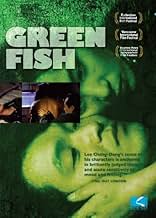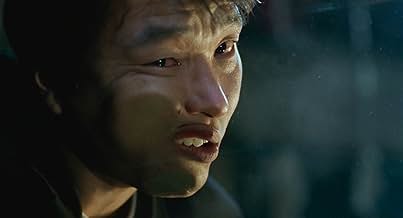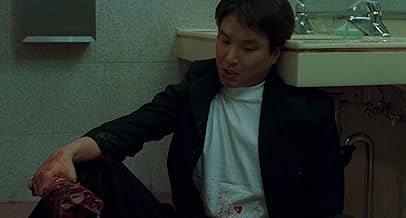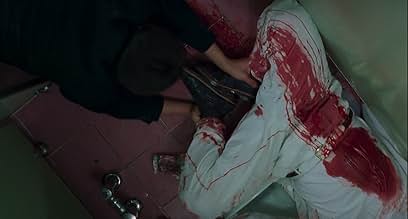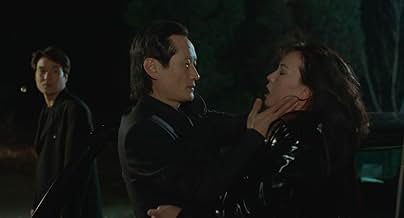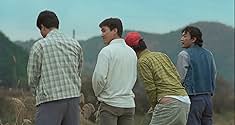AVALIAÇÃO DA IMDb
7,0/10
2,4 mil
SUA AVALIAÇÃO
Adicionar um enredo no seu idiomaReturning home and finding his town drastically changed, a former soldier falls in with gangsters.Returning home and finding his town drastically changed, a former soldier falls in with gangsters.Returning home and finding his town drastically changed, a former soldier falls in with gangsters.
- Prêmios
- 20 vitórias e 6 indicações no total
Kim Dong-gon
- Sandwich Man
- (as Dong-gon Kim)
Lee Ho Sung
- Elder brother
- (as Ho-Sung Lee)
Park Hye-Sook
- 3rd Brother's wife
- (as Hye-sook Park)
Avaliações em destaque
Lee Chang-Dong's movie have common themes I have noticed as I move backwards through his oeuvre. Male protagonists romance story tied up in a class system or one hierarchical social structure or another. Its about the indignation and class struggle, being mislead by the bright lights, whether it be women fame or fortune. The good are seldom rewarded and success is not won by having principles. Its more like a 'dogme 95' movie than a hollywood affair.
Its not overly violent and the overall tone is kinda light considering the bleak outcome of the story, conveying the absurdity of life rather than looking at it in a nihilistic way. City scapes contrast with rural city outskirts as do the inhabitants; this again puts it in similar ground to his latest movie Burning, which has alot in common with this one in many thematic ways. I would say that his fim making skills have grown and Burning was better, the cinematography for one thing is superior in the latter.
This is director Lee Chang-Dong's first film (of three) and the third that I've seen after his well-made films Peppermint Candy and Oasis. It's a story of a young man who is recently discharged from the standard military service that young Corean men are required to serve and finds that life, or the real world, is a lot harsher than his idealistic self would've expected. He soon finds himself dragged into the Corean underworld out of necessity and finds his idealism and the idealism of all those around him at odds with reality.
In a greater sense, this film is about the constant struggle between chasing your dreams and dealing with the harsh reality. All the primary characters, the mob boss, the female lead and the protagonist all have their dreams and ambitions (building a great property from the ashes of his youth, escaping the prostitute's life and living a normal one, owning a restaurant with his family), but are struck by the world's reality, which forms itself as an enemy mob, the mob bosses' controlling nature and the young protagonist's dysfunctional family.
It's a study of the nature of the relatively modern world (of Corea) and the inevitable clash of youthful idealism and experienced reality. And it doesn't take too many sides either, although the ending does seem to show that action, and sacrifice, even unintended, is what's necessary to keep yourself from being beaten down by reality.
It's a slowly-paced art film with quiet but contemplative character development, modest acting and capable directing. Directer Lee still hasn't fully gained a strong grasp of storytelling yet as a director at this point as the film as it's sometimes difficult to make out why anything's happening in the film, but the potential shows as well, with honest characters and patient development. A good start, but you can see the Director side of Lee Chang-Dong really start to pick up with his later films. It's decent. 7/10.
In a greater sense, this film is about the constant struggle between chasing your dreams and dealing with the harsh reality. All the primary characters, the mob boss, the female lead and the protagonist all have their dreams and ambitions (building a great property from the ashes of his youth, escaping the prostitute's life and living a normal one, owning a restaurant with his family), but are struck by the world's reality, which forms itself as an enemy mob, the mob bosses' controlling nature and the young protagonist's dysfunctional family.
It's a study of the nature of the relatively modern world (of Corea) and the inevitable clash of youthful idealism and experienced reality. And it doesn't take too many sides either, although the ending does seem to show that action, and sacrifice, even unintended, is what's necessary to keep yourself from being beaten down by reality.
It's a slowly-paced art film with quiet but contemplative character development, modest acting and capable directing. Directer Lee still hasn't fully gained a strong grasp of storytelling yet as a director at this point as the film as it's sometimes difficult to make out why anything's happening in the film, but the potential shows as well, with honest characters and patient development. A good start, but you can see the Director side of Lee Chang-Dong really start to pick up with his later films. It's decent. 7/10.
Green Fish is not a real gangster movie, but more an illustration of the battle between good and evil, between innocence and depravity, between the righteous one and those who only believe in the law of the strongest, between the city (and all its poisons) and the countryside (with its green fish). The law of the strongest is not only a matter of physical forces (strength, number), but also of mental ones (deception, manipulation, ambush, cynicism of the individual). The film has also a socio-economic dimension: the protagonist of the movie is a young man who has been released from the army. He has no job, but is hired by the immoral leader of a gang who appreciates his courage, his sincerity and his 'morality' (his sense of justice). And the women in all that? They have no other choice but to follow the strongest, if, and only if, they are young and beautiful. As for the unborn child, there is more than serious doubt about the real father
The first film by Lee Chang-dong contains already many ingredients of his later movies: a train, spasticity, gratuitous violence or exploitation of innocence. It says a lot about the director's vision on the way of the world.
The first film by Lee Chang-dong contains already many ingredients of his later movies: a train, spasticity, gratuitous violence or exploitation of innocence. It says a lot about the director's vision on the way of the world.
I see this as a film about how hard it is to do the right thing in the complex modern world. Makdong's family used to own acres of farmland that are now covered in ugly apartment buildings and now they get by selling eggs to the residents. All Makdong wants to do is make this easier for his family and in the process he becomes a gangster just to get by. Even the gangsters are between doing the right thing and doing what they must to survive. Makdong's "Big Brother" likes to think of himself as different from the other thieves and killers that make up the underworld but in the end he is no better.
I saw this a few years ago and remember it as sad, graceful and often funny, with a few strikingly memorable images, like the one of the glowering night club singer. Its story of a young Korean man from a loving but troubled home who ends up working for the local hoods is not wildly original, but it's well done. It is kind of unassuming and low-key, so that when the credits trekked over the final scene (which the audience rightly applauded) I was surprised at how touched I was, and I remember it overall with more clarity than most films I see.
Você sabia?
- ConexõesFeatured in Son-nim-eun-wang-e-da (2006)
Principais escolhas
Faça login para avaliar e ver a lista de recomendações personalizadas
- How long is Green Fish?Fornecido pela Alexa
Detalhes
- Tempo de duração
- 1 h 51 min(111 min)
- Cor
- Mixagem de som
- Proporção
- 1.85 : 1
Contribua para esta página
Sugerir uma alteração ou adicionar conteúdo ausente

